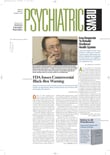Lost productivity due only to employee absenteeism may underestimate the true effect of depression on people's work lives.
A study in the October American Journal of Psychiatry suggests that diminished productivity while workers are on the job—what has been called “presenteeism”—may significantly add to the costs attributable to untreated or inadequately treated depression.
Moreover, compared with other conditions that significantly impact on-the-job productivity, depression appears to be among the most debilitating, according to the study.
Lead study author Phillip Wang, M.D., M.P.H., explained that surveyed workers were asked a series of questions that together measured two outcome variables: overall productivity and “task focus,” or the degree to which workers were able to focus diligently on a work task at hand.
“The most important finding is the consistency with which depression is associated with negative measures on both productivity and task focus,” Wang told Psychiatric News. “Previous studies have shown that the amount of work lost to depression just looking at absenteeism is about one day a month. Our study found that presenteeism accounts for a total of about 2.3 lost work days a month. So it appears that the productivity lost by depressed people at work may be larger than that lost from absenteeism.”
Wang is an assistant professor of medicine, epidemiology, and health care policy at Harvard Medical School.
The study makes use of a design known as “experience sampling” to capture work productivity at discrete moments in time while workers are at their jobs. Though the experience sampling method (ESM) has some limitations—among them that the consistency of estimates with real-life work performance is difficult to gauge—it avoids the recall bias inherent in standard self-reporting measures that require workers to remember their on-the-job performance.
The study was part of a larger survey of health and productivity conducted by the World Health Organization of two types of service workers: reservation agents working for a major airline and customer-service representatives working for a major telecommunications company. A subsample of 105 reservation agents and 181 customer-service representatives was taken from the larger survey, with deliberate over-sampling of respondents who reported either major depression or any of several other chronic conditions.
Participants were given a beeper and diaries in which they were to make entries about moment-in-time experiences at five randomly paged moments each day over seven consecutive days.
At each of the paged moments, participants recorded answers to questions using a seven-point scale designed to assess their performance. Independent effects on work-related performance were then compared across seven chronic conditions, using statistical analysis to account for co-occurrence of conditions.
The seven conditions were allergies, arthritis, asthma, back pain, headaches, high blood pressure, and major depression.
Results showed that major depression was the only condition significantly related to diminished performance in both productivity and task focus. The effects were equivalent to approximately 2.3 days absent per depressed worker a month.
In the category of task focus, depression was substantially more debilitating than the other six conditions. In the category of productivity, only back pain was more debilitating, according to the study.
Using the estimated 2.3 days a month of missed work due to presenteeism, and the one day a month lost to absenteeism found in previous studies, the researchers then calculated the combined salary-equivalent effect of major depression on absenteeism and lost productivity to be greater than $300 a month.
“The message for clinicians is that there are benefits to treating depression adequately that go beyond the clinical outcome,” Wang told Psychiatric News.
But Wang said there is also a message for employers and purchasers of health care, noting that he is involved in a large trial to see how much work productivity can be recovered if employers provide health insurance that offers excellent coverage for treatment of depression.
“The employer who purchases adequate treatment of depression might actually see a return on investment,” he said.
Am J Psychiatry 2004 161 1885
